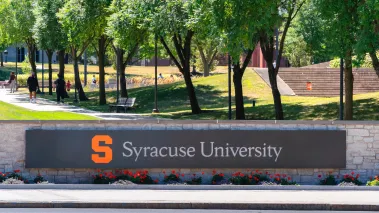Table of Contents
Syracuse slams students with multi-year suspensions for satirical fraternity roast

Mahmoud Suhail / Shutterstock.com
- Fifteen students who “roasted” each other in private were suspended for up to two years after a video of their skits leaked to Facebook several weeks later
- They were found guilty of “an immediate breach of the peace” (which did not occur) and expression that went “beyond the bounds of protected speech” (it didn’t)
SYRACUSE, N.Y., June 8, 2018 — Syracuse University should know what is “protected speech.” It emblazoned the words of the First Amendment on the facade of its school of public communications. It hosts a prestigious journalism program and is a private school that promises its students robust free speech rights. Despite this, the university just suspended 15 students from an engineering fraternity for hosting a private, satirical roast that the university claims caused “an immediate breach of the peace” and went “beyond the bounds of protected speech.” Neither of these findings are true.
The suspensions of up to two years were handed down Tuesday, after a three-person panel tried the Theta Tau students as a group and found them guilty of violating university policies. The disciplinary proceeding was prompted by the unauthorized release of certain videos from the private roast on April 18. Stripped of their satirical context, the videos were described as sexist and racist — despite the fact the pledges punished were racially diverse — and provoked calls for the university to impose discipline, even though nobody actually present at the event filed a complaint.
“When a university expels students for a private roast consisting of completely protected speech, it has no business pretending that it cares about free expression,” said Ari Cohn of the Foundation for Individual Rights in Education, which wrote to Syracuse Chancellor Kent Syverud to demand that Syracuse respect expressive rights and drop the investigation. “Despite objections that these students were being tried as a group, by a biased committee, and ‘represented’ by an agent of the university, Syracuse has the gall to maintain that justice was served.”
Among the policies the students allegedly violated is a policy prohibiting “harassment,” which is vaguely defined as expression “beyond the bounds of protected speech, directed at a specific individual(s), easily construed as ‘fighting words,’ or likely to cause an immediate breach of the peace.” New York State specifically describes disturbing the peace as “[a]busive or obscene language or gestures in public,” which does not fit the circumstances of a skit in a private residence.
The students were also found guilty of violating a policy prohibiting “destructive behavior.” According to the panel, the skit “threatened the mental health, physical health and safety” of those who sought out and viewed the weeks-old video.
“Instead of keeping its promise of freedom of expression, Syracuse’s investigators went straight to ‘show me the man and I’ll find you the crime,’ endorsing the absurd belief that the roast threatened both the mental and physical health of people who were neither mentioned in it nor present for it,” said Cohn. “Labeling this obvious satire ‘harassment’ makes light of the actual cases of serious harassment that colleges should be looking to combat, and wastes resources that could be used to investigate real offenses. Labeling it a ‘breach of the peace’ is just stupid.”
Syracuse’s tribunal relied heavily on subjective responses to the expression in justifying its decisions. It cited one student’s social media post that read, “I don’t feel safe here,” and another comment at an open forum that “videos like this promote the inability to feel safe in your own body and in the space of this campus.”
“Apparently, all that is required to throw a student out of school is that some other student claims to feel unsafe,” said Syracuse Professor of Law Gregory Germain. “Rumors and self-serving statements by anonymous students are enough to justify severe academic punishments without regard to whether the accused’s statements or conduct are objectively threatening to anyone. It’s a terrible day for due process and free speech on college campuses.”
The board claimed the students’ suspensions were necessary to allow the community “time for it to heal.” The students had just one day to file an intent to appeal the verdict.
If their appeal is successful and they wish to return to the university after their suspensions, they must perform a slew of tasks, including reading three books on “inclusion,” writing a 12-page reflection paper on what it means “to be a member of a diverse community,” and performing 160 hours of community service — more than the maximum recommended number of community service hours for Class B Misdemeanors in New York such as jury tampering.
“The message sent by Syracuse is clear: Any expression, even if it’s legal and said in a private setting, can lead to expulsion if enough people pick up their pitchforks,” said Cohn.
The Foundation for Individual Rights in Education (FIRE) is a nonpartisan, nonprofit organization dedicated to defending liberty, freedom of speech, due process, academic freedom, legal equality, and freedom of conscience on America’s college campuses.
CONTACT:
Daniel Burnett, Communications Manager, FIRE: 215-717-3473; media@thefire.org
Recent Articles
Get the latest free speech news and analysis from FIRE.

The secret war against student journalists

The Federal Bureau of Investigation (of protected speech)

The paper was her lifeboat — UMD called it interference
